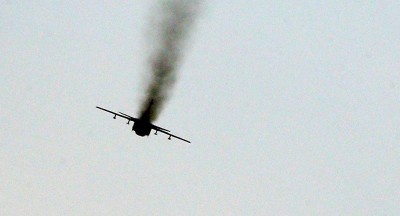Belgian Physicists Calculate that Everyone Is Lying About the Downed Russian Jet

It’s rare to see physics being used as an effective tool to comment on current events, but astrophysicists Tom van Doorsslaere and Giovanni Lapenta of the Belgian KU Leuven used some simple Newtonian mechanics to show that both the Russian and Turkish accounts of what happened with the downed jet can’t be right.
Using video of the incident and the maps provided by Turkish and Russian officials, they show in a post on a blog run by KU Leuven that what went down couldn’t possibly have happened as both parties present it.
First, the “facts.” The downed jet was shot down by the Turkish military Tuesday because the pilot reportedly ignored several warnings about entering Turkish airspace. Turkish officials say the military warned the jets ten times in a period of five minutes. When these warnings went unheeded, the Turkish prime minister himself gave the command to take the jets down, according to several reports. Both jet fighters were in Turkish airspace for just 17 seconds, Turkish officials say.
And now, the science. In the video of the incident, which was posted online, it can be seen that one of the two jets got hit and starts crashing to the ground. The jet takes approximately 30 seconds to hit the ground. “Because the vertical movement is only dependent on gravity (g=9.81m/s², z=gt²/2), we can calculate that the plane was moving at a height of at least 4500 meters,” the phisicists write in their blog. “That number is consistent with the Turkish statement of the jets being at an altitude of 19,000 feet (5800 meters).”
Map provided by Turkish officials. Image via New York Times
On the map provided by Turkish officials, it can be seen that the plane crashed eight kilometers from the place it was hit. The jet traveled those eight kilometers from the time it was hit until the time it crashed. A simple division gives an initial speed of 980 km/h, a perfectly acceptable speed for an aircraft travling at that altitude. So far, so good.
Then, the physicists take that speed and compare it to the distance the jets traveled in Turkish airspace according to the Turkish map, around 2 kilometers. When flying at a speed of 980 km/h, an object would cover that distance in seven seconds, instead of the 17 seconds according to Turkish reports. To cross that distance in 17 seconds, the plane should have been traveling at a meager 420 km/h. The video shows this simply could not be true, if the crash site is accurate. Physics 1, Turkey 0.
The Turkish airforce says it warned the fighter jets ten times in five minutes. In five minutes, an aeroplane traveling at 980 km/h would cross a distance of about 80 kilometers. From these facts, the professors conclude: “How could the Turkish airforce predict that the Russian jets were about to enter Turkish airspace? Military jets are very agile, and in theory the Russian jets could have turned at the last moment to avoid Turkish airspace. The warnings issued to the Russian pilots were mere speculation at the moment they were made.”
According to those facts, the warnings couldn’t possibly have been issued in the time the jets were in Turkish territory. Unless Turkish air controllers can speak impossibly fast, issuing ten warnings in seven seconds seems kinda improbable. Physics 2, Turkey 0.
In issues like these, there’s never one party to blame. This is international geopolitics, a discipline in which the truth is as malleable as Play-Doh.

The map that was spread by Russian officials. Image via Ku Leuven Blogt
On the Russian map, it can be seen that the plane makes a ninety degree turn after it was hit, which is quite impossible. According to the physicists, the only way this could be achieved is if the momentum of the incoming rocket was so much larger than the momentum of the jet that the latter would be negligible. “A change of course of 90 degrees can only be achieved with an object that’s many times heavier or faster than the jet,” the physicists write. From this we can conclude that the jets were not actively trying to avoid Turkish territory, which is the Russian side of the story. Physics 3, Turkey 0, Russia 0.
You’re free to decide what political conclusions you arrive at with this information. The authors don’t mention the whole political situation, they just focus trying to distill facts out of the observable information: a rare and admirable thing in a time in which almost everything comes with some political spin.
This article originally appeared on Motherboard Netherlands.

